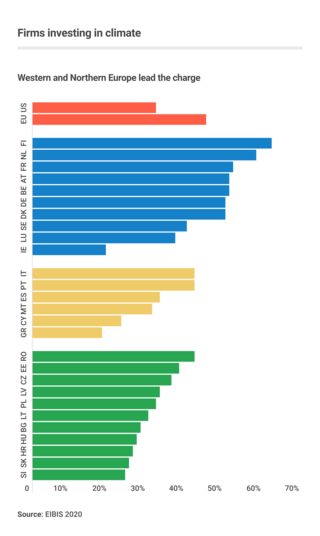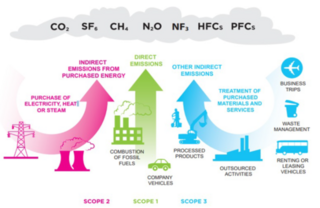The British Academy of Film and Television Arts is an independent trade association and charity that supports, develops, and promotes the arts of film, television and video games in the United Kingdom. In addition to its annual award ceremonies, BAFTA has an international programme of learning events and initiatives offering access to talent through workshops, masterclasses, scholarships, lectures, and mentoring schemes in the United Kingdom and the United States.

The Carbon Trust is a United Kingdom-based consultancy established in March 2001. Its aim is to accelerate the pace of private sector decarbonisation and increase energy efficiency in the United Kingdom and worldwide.
Interface, Inc. is a global manufacturer of commercial flooring with an integrated collection of carpet tiles and resilient flooring, including luxury vinyl tiles (LVT) and nora brand rubber flooring.

A carbon footprint (or greenhouse gas footprint) is a calculated value or index that makes it possible to compare the total amount of greenhouse gases that an activity, product, company or country adds to the atmosphere. Carbon footprints are usually reported in tonnes of emissions (CO2-equivalent) per unit of comparison. Such units can be for example tonnes CO2-eq per year, per kilogram of protein for consumption, per kilometer travelled, per piece of clothing and so forth. A product's carbon footprint includes the emissions for the entire life cycle. These run from the production along the supply chain to its final consumption and disposal.

Business action on climate change is a topic which since 2000 includes a range of activities relating to climate change, and to influencing political decisions on climate change-related regulation, such as the Kyoto Protocol. Major multinationals have played and to some extent continue to play a significant role in the politics of climate change, especially in the United States, through lobbying of government and funding of climate change deniers. Business also plays a key role in the mitigation of climate change, through decisions to invest in researching and implementing new energy technologies and energy efficiency measures.

Leadership in Energy and Environmental Design (LEED) is a green building certification program used worldwide. Developed by the non-profit U.S. Green Building Council (USGBC), it includes a set of rating systems for the design, construction, operation, and maintenance of green buildings, homes, and neighborhoods, which aims to help building owners and operators be environmentally responsible and use resources efficiently.
Eco commerce is a business, investment, and technology-development model that employs market-based solutions to balancing the world's energy needs and environmental integrity. Through the use of green trading and green finance, eco-commerce promotes the further development of "clean technologies" such as wind power, solar power, biomass, and hydropower.

Carbon accounting is a framework of methods to measure and track how much greenhouse gas (GHG) an organization emits. It can also be used to track projects or actions to reduce emissions in sectors such as forestry or renewable energy. Corporations, cities and other groups use these techniques to help limit climate change. Organizations will often set an emissions baseline, create targets for reducing emissions, and track progress towards them. The accounting methods enable them to do this in a more consistent and transparent manner.

Aircraft engines produce gases, noise, and particulates from fossil fuel combustion, raising environmental concerns over their global effects and their effects on local air quality. Jet airliners contribute to climate change by emitting carbon dioxide, the best understood greenhouse gas, and, with less scientific understanding, nitrogen oxides, contrails and particulates. Their radiative forcing is estimated at 1.3–1.4 that of CO2 alone, excluding induced cirrus cloud with a very low level of scientific understanding. In 2018, global commercial operations generated 2.4% of all CO2 emissions.

The availability and uptake of green electricity in the United Kingdom has increased in the 21st century. There are a number of suppliers offering green electricity in the United Kingdom. In theory these types of tariffs help to lower carbon dioxide emissions by increasing consumer demand for green electricity and encouraging more renewable energy plant to be built. Since Ofgem's 2014 regulations there are now set criteria defining what can be classified as a green source product. As well as holding sufficient guarantee of origin certificates to cover the electricity sold to consumers, suppliers are also required to show additionality by contributing to wider environmental and low carbon funds.
The carboNZero programme and CEMARS programme are the world’s first internationally accredited greenhouse gas (GHG) certification schemes under ISO 14065. They provide tools for organisations, products, services and events to measure and reduce their greenhouse gas emissions, and optionally offset it. The programmes are owned and operated by Toitū Envirocare - Enviro-Mark Solutions Limited, a wholly owned subsidiary of Landcare Research.

An aviation biofuel is a biofuel used to power aircraft. The International Air Transport Association (IATA) considers it a key element in reducing the environmental impact of aviation. Aviation biofuel is used to decarbonize medium and long-haul air travel. These types of travel generate the most emissions, and could extend the life of older aircraft types by lowering their carbon footprint. Synthetic paraffinic kerosene (SPK) refers to any non-petroleum-based fuel designed to replace kerosene jet fuel, which is often, but not always, made from biomass.

Bullfrog Power, an Envest company, is a Canadian green energy retailer operating in Canada. Bullfrog offers green electricity from renewable energy sources such as wind, solar, and low-impact hydro, as well as green fuel and green natural gas, a renewable biogas product that serves as an alternative to fossil fuel-based natural gas. Bullfrog only sources electricity from generation sources that meet or exceed the federal government's Environmental Choice Program EcoLogo standard for renewable electricity. Bullfrog's green natural gas product is produced at facilities that have met environmental standards as defined by ICF International.

Belgrave Trust was a social enterprise firm that sold carbon offsets. It claimed that revenues derived through subscribers and the sale of products were used to offset greenhouse gases through the purchase and retirement of carbon offset securities that fund projects creating clean energy or reducing emissions.

Green building is a technique that aims to create structures that are environmentally responsible and resource-efficient throughout their lifecycle – including siting, design, construction, operation, maintenance, renovation, and demolition. A 2009 report by the U.S. General Services Administration evaluated 12 sustainably designed GSA buildings and found they cost less to operate.
ISO 20121 is a voluntary international standard for sustainable event management, created by the International Organization for Standardization. The standard aims to help organizations improve sustainability throughout the entire event management cycle.

Sustainable film production is the concept of film production with particular concern for environmental, economic, and social issues. Sustainability in film production incorporates socially and environmentally responsible decision making into the pre-production and production of the film. It involves sustainable development principles at all levels of filmmaking and is best accomplished in a unified manner with collaboration and cooperation from all departments or participants in making the film. The sustainability of the film production should start at the launch of the project, and involve all of the key stakeholders including the director, film producer, production or costume designer, cast, and crew.

Pure Planet was a British energy supply company 24% owned by BP. The company, which was founded in 2015 and based in Bath, England, supplied electricity and gas to domestic customers in the UK. It ceased trading on 13 October 2021 following BP's withdrawal of support. On 17 October, Ofgem appointed Shell Energy as the new supplier of Pure Planet's customers.

The Science Based Targets initiative (SBTi) is a collaboration between the CDP, the United Nations Global Compact, World Resources Institute (WRI) and the World Wide Fund for Nature (WWF), with a global team composed of people from these organisations. As of 2024, nearly 10,000 companies have science-based climate targets validated by SBTi.
Yayzy is a London-based software company which developed and operates an application for estimating personal carbon emissions, based on a consumer's behaviour, including purchases and environmental work. It also provides this technology to banks and fintechs, as an application programming interface, to offer CO2 tracking, calculation, reduction and offsetting to their customers. The company uses machine learning and big data analysis to assess purchases and provide users with carbon emissions data associated with their purchases.














